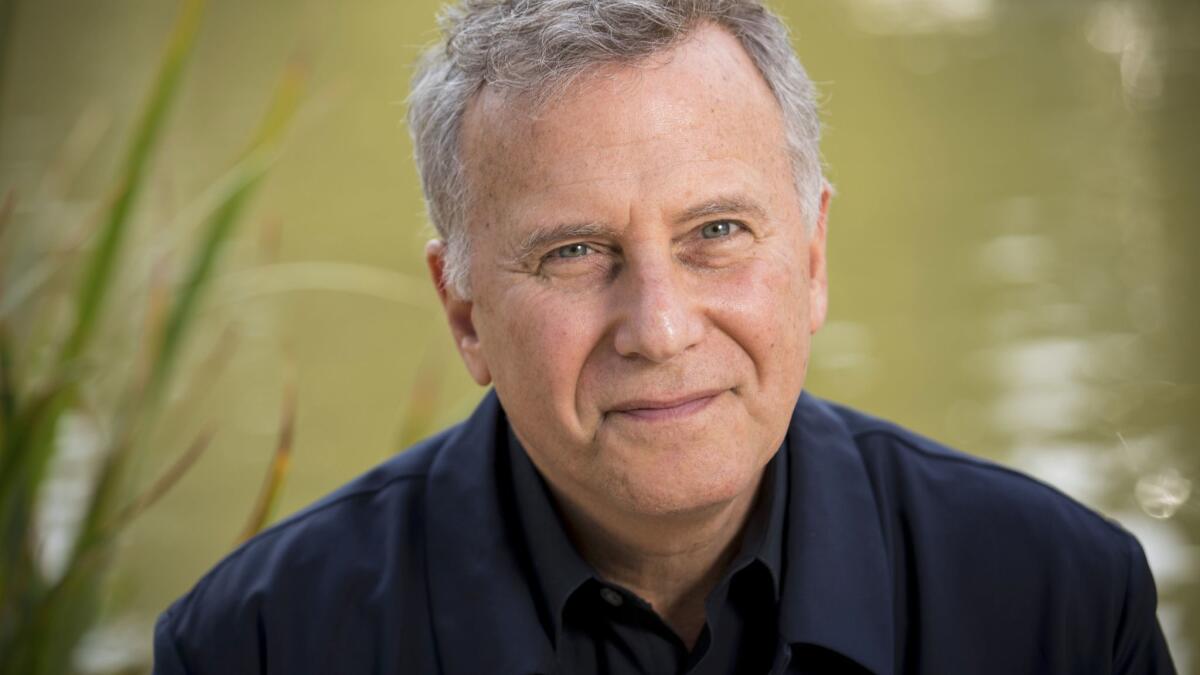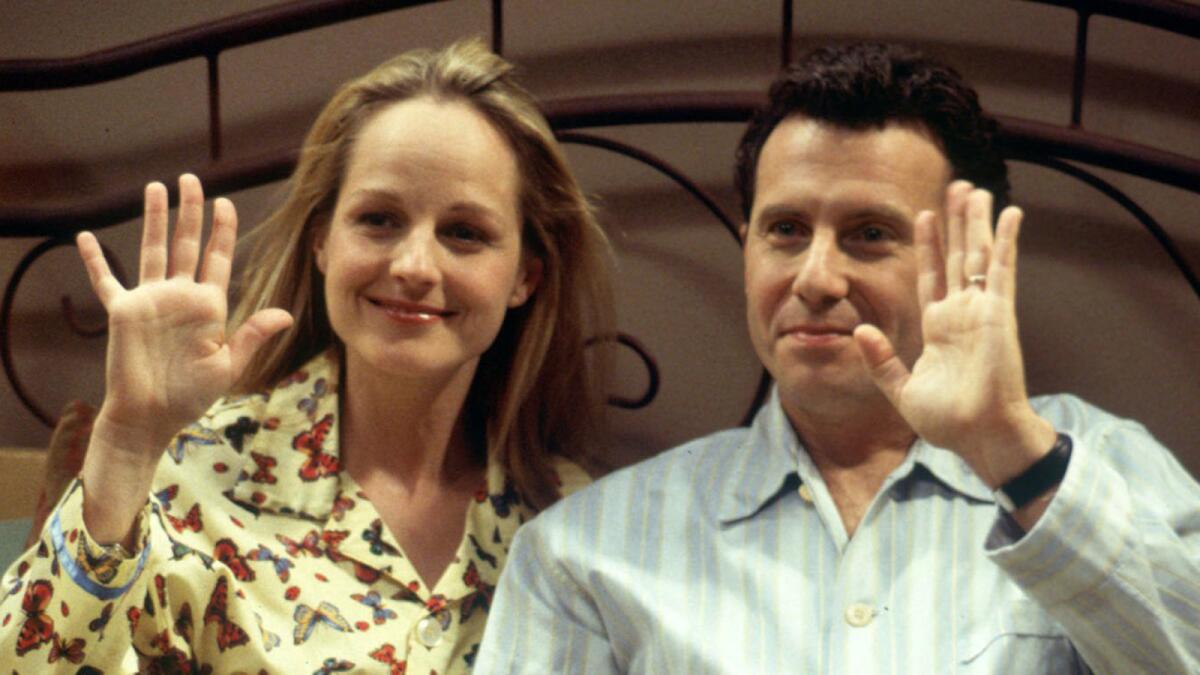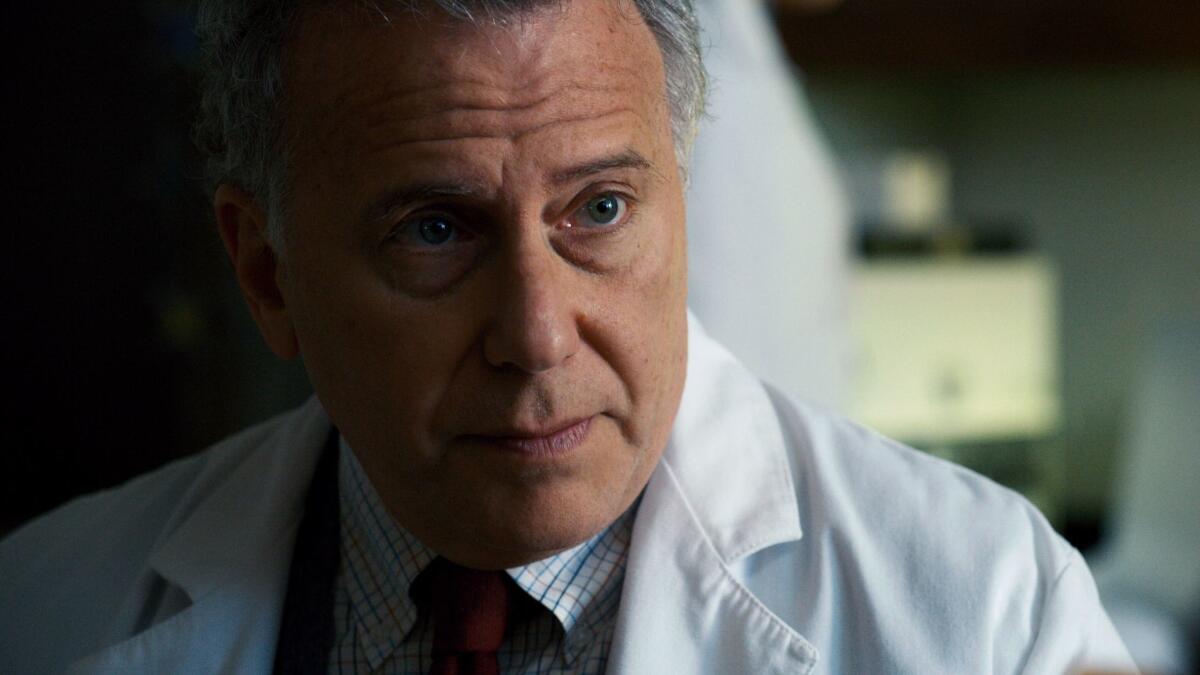Q&A: ‘Stranger Things’ star Paul Reiser never plays it straight when it comes to his career

Paul Reiser never had a plan.
Looking at his long and diverse career, it is indeed hard to see many straight lines between, say, the roast beef sandwich-coveting Modell of the Barry Levinson classic “Diner” and the author of three books of homespun wisdom — “Couplehood,” “Babyhood” and “Familyhood.” Or to find the links tethering his entertaining villain Carter Burke of “Aliens” and the musician-composer who released 2010’s “Unusual Suspects,” a lovely album of ambient piano pop with singer-songwriter Julia Fordham.
And that’s not even mentioning the New York native’s launching pad stand-up career— which he has returned to in recent years— his acting and producing role on the long-running ’90s sitcom “Mad About You” — which netted him six Emmy nominations for lead actor— and his current state as the master of all streaming media.

Reiser, 61, currently has a hand in three period pieces. On Netflix he plays Dr. Sam Owens on the retro-extravaganza that is “Stranger Things 2.” On Amazon he is reprising his role as the complex Doug Getty on the final season of the underrated and also ’80s-set “Red Oaks.” And the bittersweet ’70s comedy “There’s…. Johnny!” — a fictional look behind the scenes of “The Tonight Show” Reiser co-created — began streaming on
We recently chatted with the expansive, funny and thoughtful comic-actor-writer-producer-author-musician at a Beverly Hills restaurant about how, for a man without a plan, he’s certainly kept busy.
“Maybe I'll see it when I'm older, and further down the line, but I don't think there's ever been a design to any of this for me,” he says. “I mean, I really just wanted to be a stand-up.”
You studied music in college but wound up in comedy and acting. What made you pivot?
This is the best advice I ever got, and I use this now with young people. I met a guy who is in advertising, commercial music. I said, "I don't know, I think maybe I could do that." He said, "It's really hard. If there's anything else you can do, do that." I said, "OK, thank you." I ran away. I went, "All right, that was easy."
So immediately you folded.
Yes. Whereas if somebody said that about stand-up — which I do, “Hey, if you can do anything else, do it" — and if they're still there, it means they want to do it. Because there's no reasonable, rational reason for any young person to say, "I want to be a comedian. I want to be an actor."
And constantly be rejected.
I need the constant rejection.
But you kept music in your life, releasing your album with Julia. Did you tour?
We did half a dozen shows; I wouldn't call it a tour.
Was that your first time performing musically in that way? What was that like?
It was delightful, because it was the first time I'd ever been on stage and didn't have to talk.
What a funny thing for a stand-up to say.
But I also don't have enough experience as a piano player. I couldn't really lead the band, and I had to let the drummer count us off. A lot of times I'd go to the verse instead of the chorus, and they'd all look at me like, "Oh no! Comedy boy just brought the whole thing to a grinding halt."
So you are now suddenly everywhere on the streaming services and they are all period shows to boot.
Here's the thing. I don't have to write "Stranger Things." “Red Oaks” I didn’t write. The Carson thing [“There’s… Johnny!”] is the only thing, it's period for a reason, and it informs it. But "Stranger Things" could be in the moment. It doesn't have to be in the ’80s but they love those films.

You’ve been working on “There’s… Johnny!” for over 10 years. What was your original inspiration?
My buddy [and producing partner]
Pretty soon we thought it'd be really nice if we could use actual clips. And even if we didn't have the clips, I didn't want to do it without the blessing of Johnny. I don't think it ever got to Johnny, but… I sat down with Jeff Sotzing, who was Johnny's nephew, who had risen through the ranks, and now runs the Carson company. I pitch him this idea: "It's a kid. He's behind the scenes, he keeps screwing up, he's not even supposed to be there, but Johnny took a shine to him 'cause he's from Nebraska like Johnny. So nobody can touch him.” He goes, "Well, you know that's my life story." I said, "No, I don't, thanks."
We'd bring it up with Jeff every couple of years. "Nah, not quite ready yet." And then finally he said, "Let's do it."
So it was perseverance?
Yeah. He saw my determination. He knew Johnny was very gracious to me, and supportive of me. He had me on a lot. He knew that I would be a responsible guardian of Johnny's legacy.
With all the revivals of late, have you been considering a return to “Mad About You”? You all sewed it up pretty tight in the finale.
It's possible. We had a great run, and that finale that you just described was very deliberate. We wanted to show people what happens to them in the future, and we kind of wanted to handcuff ourselves and never be tempted to come back. Part of [the complicated ending that involved a breakup and reunion] by the way, was we wanted to say, "It's never easy. Even this couple, it went up and down." They did live happily ever after, but it wasn't a straight line. So for years, I never wanted to come back. Only in the last two months, everyone’s asking me. My answer is, I'm still not convinced we need to, or should, or anybody needs it, but I'm not opposed to it, because I now could see how it could work.
What gave you the itch to return to stand-up?
What happened is, I did an emcee thing at some charity gig, which is not really stand-up. You tell a joke or two, you make fun of the people in the audience. But it was such a good audience, and it was so fun. One little thing I had written for it worked. I got offstage: "God, I forgot how much I love that." So I just went back to the clubs, exactly as I did when I was 18.
Were you scared at all?
When I first went to the club, I was in college. I knew nothing, which sort of insulates you. It's like you're in so much denial that you don't realize how without skill you are. And then when I went back five years ago it was really weird. You know when your leg falls asleep, and you get up and you try to walk? You know how to walk, but it's just not firing? Something is wrong.
It takes a little while. You have to bang on it.
You just have to bang on it and wait for the thing to pass. I went there. I went, "I know how to do this, but the brain's not firing. I don't have the wealth of material." It was odd. The audience is kind of looking at you like, "Why are you here?" And the other comedians are going, "Why are you here?" It was really funny. Young comics who knew of me would say, "You putting together an HBO special?" "No." "Are you getting ready for a guest shot for Letterman or something?" "No." "Well, why would you be here on a Tuesday?" And I really loved saying to them, "To get better."
What are you watching?
“Ray Donovan.” [Liev Schreiber’s] great, and the writing is good. I'm only halfway through this season, they do a lot of deep flashbacks. It's an interesting thing. The first couple episodes that are referring to things, I'm like, "Did I miss that?" And then they show you [in flashback], and I'm like, "Well, why didn't you tell me?" I was calling my doctor about my memory.
The complete guide to home viewing
Get Screen Gab for everything about the TV shows and streaming movies everyone’s talking about.
You may occasionally receive promotional content from the Los Angeles Times.




